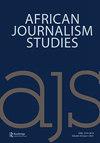“我被形容为好记者,因为我‘强硬’”:女性化在津巴布韦新闻编辑室仍被视为一个弱点
IF 1.8
3区 文学
Q3 COMMUNICATION
引用次数: 1
摘要
本文调查了津巴布韦私营和国有媒体公司的新闻实践和新闻编辑室文化。该论文超越了性别人数,分析了记者对日常工作和行为的文化解读,以及这如何有助于新闻编辑室权力关系的构建。对来自津巴布韦选定新闻编辑室的16名记者进行了半结构化采访,以挖掘他们的职业生活经历。利用新闻文化概念、女权主义立场认识论和交叉性,研究发现,由于对女性和男性角色的文化解释,津巴布韦记者继续经历性别偏见;来自媒体经理、男同事和消息来源的微妙性骚扰日益增多;以及故意压制妇女的声音。此外,糟糕的经济表现助长了不道德的新闻行为。该研究还揭示了性别如何与其他社会规范交叉,如女性的位置/定位、种族、年龄和在新闻编辑室的多年经验,从而进一步剥夺女记者的特权。记者(包括男性和女性)有意采用女权主义新闻,目的是为非压迫性的新闻文化做出贡献。本文章由计算机程序翻译,如有差异,请以英文原文为准。
“I’m Described as Good Journalist Because I Am ‘Tough’”: How Femininity Is Still Considered a Weakness in Zimbabwean Newsrooms
ABSTRACT This paper investigates journalism practice and newsroom cultures in both private and state media companies in Zimbabwe. The paper moves beyond the gender body count to analyse journalists’ cultural interpretations of their everyday work and actions and how this contributes to the structuring of power relations in the newsrooms. Semi-structured interviews were conducted with 16 journalists from selected Zimbabwean newsrooms to unearth their lived experiences of the profession. Using the journalism culture concept, feminist standpoint epistemology and intersectionality, the study found out that Zimbabwean journalists continue to experience gender biases owing to cultural interpretations of the roles of women and men; increasing subtle sexual harassment from both media managers, male colleagues and sources; and deliberate silencing of women’s voices. Further, a poor performing economy contributes to unethical journalism practices. The study also reveals how gender intersects with other social norms such as the location/positioning of women, ethnicity, age, and years of experience in the newsroom to further dis-privilege female journalists. There are deliberate efforts by journalists (both male and female) to employ feminist journalism—with the goal of contributing towards a journalistic culture that is non-oppressive.
求助全文
通过发布文献求助,成功后即可免费获取论文全文。
去求助
来源期刊

African Journalism Studies
COMMUNICATION-
CiteScore
1.90
自引率
10.00%
发文量
18
期刊介绍:
Accredited by the South African Department of Higher Education and Training for university research purposes African Journalism Studies subscribes to the Code of Best Practice for Peer Reviewed Scholarly Journals of the Academy of Science of South Africa. African Journalism Studies ( AJS) aims to contribute to the ongoing extension of the theories, methodologies and empirical data to under-researched areas of knowledge production, through its emphasis on African journalism studies within a broader, comparative perspective of the Global South. AJS strives for theoretical diversity and methodological inclusivity, by developing theoretical approaches and making critical interventions in global scholarly debates. The journal''s comparative and interdisciplinary approach is informed by the related fields of cultural and media studies, communication studies, African studies, politics, and sociology. The field of journalism studies is understood broadly, as including the practices, norms, value systems, frameworks of representation, audiences, platforms, industries, theories and power relations that relate to the production, consumption and study of journalism. A wide definition of journalism is used, which extends beyond news and current affairs to include digital and social media, documentary film and narrative non-fiction.
 求助内容:
求助内容: 应助结果提醒方式:
应助结果提醒方式:


